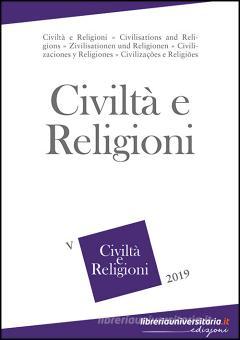
Civiltà e Religioni
- Data di Pubblicazione:
- 25 marzo 2020
- EAN:
1242131519054
- Pagine:
- 164
- Formato:
- Protezione:
- DRM Adobe
- Dimensione:
- 1.63 Mb
Contenuti
Editoriale
Articoli
The Muridiyya is a Muslim Sufi brotherhood (tariqa) founded in Senegal in the late 19th century by the spiritual leader Cheikh Ahmadou Bamba Mbacké. Currently, the order counts more than 9 million affiliates all over the world. Touba, its Holy City, is the destination of an annual pilgrimage involving about 4 million people: the Grand Magal. This rite has a strong impact in the construction of Cheikh Bamba’s legend and on mouride’s philosophy. Applying Ernesto de Martino’s lesson on the historical function of myth, this contribution aims to observe how it affects the perception of identity of individuals and groups in the context of the Senegalese diaspora.
The Western understanding of human nature is far from being universally and univocally shared. This implies that supposedly identical transcultural traits such as religion as a sacred sphere intrinsically distinct from other domains noticeably the economic or the political are just as ethnocentrically equivocal. Ethnographic evidence from ancestral Africa speaks as much about non-religious periods and peoples as sociological surveys now witness to the emergence of societies saying “No!” to the onto-theological religiosity in question.
The Lazarist Giuseppe Sapeto played a crucial role in the first stages of the Roman Catholic evangelization of Ethiopia since his arrival in Adua on May, 3rd 1838. The strategical outputs of his missionary activity are here reconstructed by means of a close analysis of the correspondence exchanged with his Order and with the heads of the Congregation of Propaganda Fide until 1842, when he was temporary called back in Europe.
This paper describes how, according to the Jesuit strategy, the people of the Kingdoms of Kongo and Angola had first to be subjected to a proper civil power and only afterwards be converted. This, however, could not be achieved until the end of the 16th century, since before then the Portuguese did not hold a military force strong enough to take and maintain control of the central African kingdoms. Considering such political imbalance, I show how the Jesuits had to negotiate with African kings and chieftains the place for their mission in the region. My main hypothesis is that in order to be acknowledged by their native interlocutors, Christian missionaries had to identify themselves with local sorcerers, the privileged ritual agents and the controllers of the relations between society and nature. Following an analysis of Jesuits sources on such negotiations, I discuss the intercultural and practical dimension of the concept of religion in the central African context.
The holy city of Touba is always described as the monumental capital of the murid brotherhood, destination and cradle of its pilgrimages, its cults and its religious history. Today it is the second most populated and dynamic city in Senegal and extends over an ever-larger territory which has now incorporated the neighbouring cities of Darou Salam and Mbacké Baol. The latter is always represented as a periphery defeated by the success and development of the “spiritual metropolis”. But a careful ethnographic look and an analysis of the ordinary daily life reveal all the importance of this secular city at the gates of the caliphate. With its “invisible and embodied infrastructures”, Mbacké is still today the center of social, economic and cultural life whose “ethical landscapes” are inseparable from those of the Tubian Sufi universe. Acknowledging the importance of Mbacké at the margins of the great narratives and the baroque iconography of the brotherhood means giving back to the “historicity of everyday life” all the ethnographic density that belongs to it.


